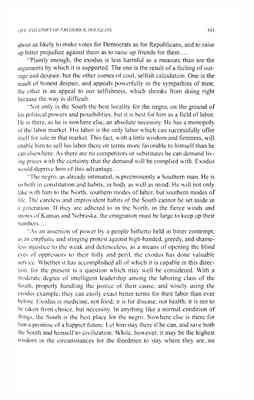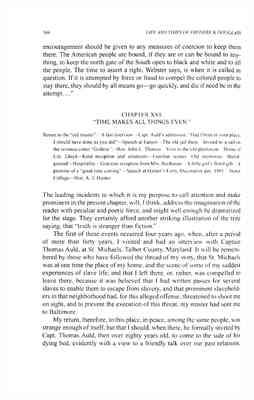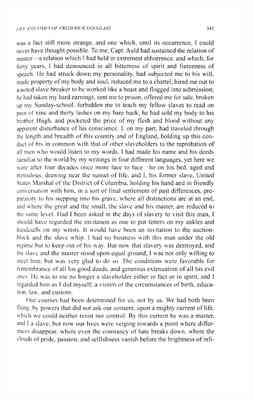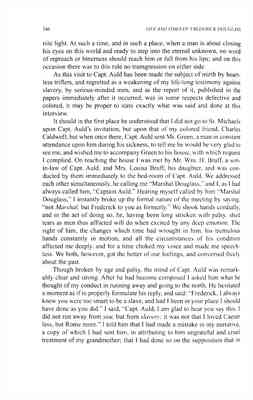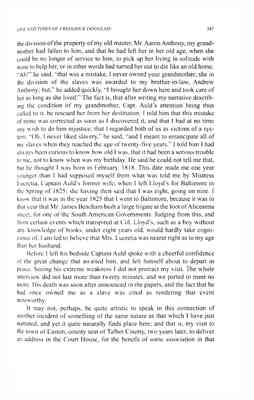Pages
191
LIFE AND TIMES OF FREDERICK DOUGLASS 343
about as likely to make votes for Democrats as for Republicans, and to raise up bitter prejudice against them as to raise up friends for them....
"Plainly enough, the exodus is less harmful as a measure than are the arguments by which it is supported. The one is the result of a feeling of outrage and despair; but the other comes of cool, selfish calculation. One is the result of honest despair, and appeals powerfully to the sympathies of men; the other is an appeal to our selfishness, which shrinks from doing right because the way is difficult.
"Not only is the South the best locality for the negro, on the ground of his political powers and possibilities, but it is best for him as a field of labor, He is there, as he is nowhere else, an absolute necessity. He has a monopoly of the labor market. His labor is the only labor which can successfully offer itself for sale in that market. This fact, with a little wisdom and firmness, will enable him to sell his labor there on terms more favorable to himself than he can elsewhere. As there are no competitors or substitutes he can demand living prices with the certainty that the demand will be complied with. Exodus would deprive him of this advantage....
"The negro, as already intimated, is preeminently a Southern man. He is so both in constitution and habits, in body as well as mind. He will not only take with him to the North, southern modes of labor, but southern modes of life. The careless and improvident habits of the South cannot be set aside in a generation. If they are adhered to in the North, in the fierce winds and snows of Kansas and Nebraska, the emigration must be large to keep up their numbers....
"As an assertion of power by a people hitherto held in bitter contempt, as an emphatic and stinging protest against high-handed, greedy, and shameless injustice to the weak and defenceless, as a means of opening the blind eyes of oppressors to their folly and peril, the exodus has done valuable service. Whether it has accomplished all of which it is capable in this direction, for the present is a question which may well be considered. With a moderate degree of intelligent leadership among the laboring class of the South, properly handling the justice of their cause, and wisely using the exodus example, they can easily exact better terms for their labor than ever before. Exodus is medicine, not food; it is for disease, not health; it is not to be taken from choice, but necessity. In anything like a normal condition of things, the South is the best place for the negro. Nowhere else is there for him a promise of a happier future. Let him stay there if he can, and save both the South and himself to civilization. While, however, it may be the highest wisdom in the circumstances for the freedmen to stay where they are, no
192
344 LIFE AND TIMES OF FREDERICK DOUGLASS
encouragement should be given to any measures of coercion to keep them there. The American people are bound if they are or can be bound to anything to keep the north gate of the South open to black and white and to all the people. The time to assert a right Webster says is when it is called in question. If it is attempted by force or fraud to compel the colored people to stay there they should by all means go~go quickly and die if need be in the attempt.... "
CHAPTER XVI. "TIME MAKES ALL THINGS EVEN." Return to the "old master"---A last interview---Capt. Aulds admission. "Had I heen in your place. I should have done as you did"--- Speech at Easton -- The old _jail there Invited to sail on the revenue cutter "Guthrie"---Hon. John L. Thomas Visit to the old plantation Home of Col. Lloyd---Hospitality---Gracious reception from Mrs. Buchanan A little girl's floral gift A promise of a "good time coming"---Speech at Harpers Ferry. Decoration day. 1881 Storer College---Hon. A. J. Hunter.
The leading incidents to which it is my purpose to call attention and make prominent in the present chapter will I think address the imagination of the reader with peculiar and poetic forc and might well enough be dramatized for the stage. They certainly afford another striking illusttation of the trite saying, that "truth is stranger than fiction."
The first of these events occurrred four years ago when after a period of more than forty years. I visited and had an interview with Captain Thomas Auld at St. Michaels Talbot Count Maryland. It will be remembered by those who have followed the thread of my story, that St. Michaels was at one time the place of my home, and the scene of my saddest experience of slave life: and that I left there. or. rather, was compelled to leave there becauses it was believed that I had written passes for several slaves to enable them to escape from slavery and that prominent slaveholdera in that neighborhood had. for this alleged offense. threatened to shoot me on sight and to prevent the execution of this threat. my master had sent me to Baltimore. My return, therefore to this place in peace among the same people was strange enough of itself but that I should, when there be formally invited by Capt. Thomas Auld then over eighty years old to come to the side of his dying bed evidentally with a view to a friendly talk over our past relations.
193
LIFE: AND TIMES OF FREDERICK DOUGLASS
345
was a fact still more strange, and one which, until its occurrence, I could never have thought possible. To me, Capt. Auld had sustained the relation of master~a relation which I had held in extremest abhorrence, and which, for forty years, I had denounced in all bitterness of spirit and fierceness of speech. He had struck down my personality, had subjected me to his will, made property of my body and soul, reduced me to a chattel, hired me out to a noted slave breaker to be worked like a beast and flogged into submission; he had taken my hard earnings, sent me to prison, offered me for sale, broken up my Sunday-school. forbidden me to teach my fellow slaves to read on pain of nine and thirty lashes on my bare back: he had sold my body to his brother Hugh. and pocketed the price of my flesh and blood without any apparent disturbance of his conscience. I. on my part. had traveled through kngth and breadth ofthis country and of England, holding up this conduct of his in common with that of other slaveholders to the reprobation of all men who would listen to my words. I had made his name and his deeds familiar to the world by my writings in four different languages, yet here were after four decades once more face to face---
11 ere a Iler four decades once more face to face~he on his bed. aged and tremulous. drawing near the sunset of life. and I. his former slave, United States :\1arshal of the District of Columbia. holding his hand and in friendly cnn1 ersation " ·ith him. in a sort of final settlement of past differences, preparatory to his stepping into his grave. where all distinctions are at an end, and where the great and the small. the sla1e and his master. are reduced to thl' same le1cl. Had I been asked in the days of sla1ery to visit this man, I should have regarded the invitation as one to put fetters on my ankles and handcuffs on my wrists. It would ha,·e been an invitation to the auctionblock and the slave 11 hip. I had no business with this man under the old regime but to keep out of his 11ay. But now that slal'ery was destroyed, and the sl,m.: and the master stood upon equal ground. I was not only willing to meet h11n. but was wry glad to do so . The conditions were favorable for remembrance of all his good deeds. and generous extenuation of all his evil ones. I le was to me no longer a sla, eholder either in fact or in spirit, and I regarded him as I did myself: a victim of the circumstances of birth, education. law. and custom. Our courses had been detennined for us. not by us. We had both been flung. by powers that did not ask our consent. upon a mighty current of life. 11 h1ch we could neither resist nor control. By this current he was a master. and I a slave: but now our lives were verging towards a point where differences disappear. where even the constancy of hate breaks down. where the clouds of pride. passion. and selfishness vanish before the brightness of inti-
194
346
LIFE AND TIMES OF FREDERICK DOUG!.ASS
nite light. At such a time and in such a place when a man is about closing his eyes on this world and ready to step into the eternal unknown no word of reproach or bitterness should reach him or fall from his lips; and on this occasion there was to this rule no transgression on either side. As this visit to Capt. Auld has been made the subject of mirth by heartless triflers and regretted as a weakening of my life-long testimony against slavery by serious-minded men and as the report of it published in the papers immediately after it occurred was in some respects defective and colored it may be proper to state exactly what was said and done at this interview. It should in the first place be understood that I did not go to St. Michaels upon Capt. Auld's invitation, but upon that of my colored friend. Charles Caldwell; but when once there Capt. Auld sent Mr. Green a man in constant attendance upon him during his sickness to tell me he would be very glad to see me and wished me to accompany Green to his house. with which request I complied. On reaching the house I was met by Mr. Wm. H. Bruff: a son-in-law of Capt. Auld and Mrs. Louisa Bruff his daughter and was conducted by them immediately to the bed-room of Capt. Auld. We addressed each other simultaneously he calling me "Marshal Douglass" I instantly broke up the formal nature of the meeting by saying "not Marshal but Frederick to you as formerly." We shook hands cordially and in the act of doing so he, having been long stricken with palsy shed tears as men thus affiicted will do when excited by any deep emotion. The sight of him the changes which time had wrought in him, his tremulous hands constantly in motion and all the circumstances of his condition affected me deeply and for a time choked my voice and made me speechless. We both however got the better of our feelings and conversed freely about the past.
Though broken by age and palsy the mind or Capt. Auld was remarkably clear and strong. After he had become composed I asked him what he thought of my conduct in running away and going to the north. He hesitated a moment as if to properly formulate his reply and said: "Frederick. I always knew you were too smart to be a slave, and had I been in your place I should have done as you did." I said "Capt. Auld, I am glad to hear you say this. I did not run away from you, but from slavery; it was not that I loved Caesar less, but Rome more." I told him that I had made a mistake in my narrative a copy of which I had sent him, in attributing to him ungrateful and cruel treatment of my grandmother; that I had done so on the supposition that in
195
LIFE AND TIMFS OF FREDERICK DOUGLASS
347
the division of the property of my old master Mr. Aaron Anthony, my grandmother had fallen to him and that he had left her in her old age when she could be no longer of service to him to pick up her living in solitude with none to help her or in other words had turned her out to die like an old horse. "Ah!" he said "that was a mistake I never owned your grandmother; she in the division of the slaves was awarded to my brother-in-law Andrew Anthony; but," he added quickly "I brought her down here and took care of her as long as she lived." The fact is that after writing my narrative describing the condition of my grandmother Capt. Aulds attention being thus called to it he rescued her from her destitution. I told him that this mistake or mine was corrected as soon as I discovered it and that I had at no time any wish to do him injustice; that I regarded both of us as victims of a system. "Oh I never liked slavery" he said, "and I meant to emancipate all of my slaves when they reached the age of twenty-five years." I told him I had always been curious to know how old I was that it had been a serious trouble to me not to know when was my birthday. He said he could not tell me that but he thought I was born in February, 1818. This date made me one year younger than I had supposed myself from what was told me by Mistress Lucretia, Captain Auld's former wife when I left Lloyds for Baltimore in the Spring of 1825: she having then said that I was eight going on nine. I know that it was in the year 1825 that I went to Baltimore, because it was in that year that Mr. James Beacham built a large frigate at the foot of Aliceanna street, for one of the South American Governments. Judging from this and from certain e,ents which transpired at Col. Lloyds. such as a boy without any knowledge of books under eight years old would hardly take cognizance of, I am led to believe that Mrs. Lucretia was nearer right as to my age than her husband.
Before I left his bedside Captain Auld spoke with a cheerful confidence of the great change that awaited him, and felt himself about to depart in peace. Seeing his extreme weakness I did not protract my visit. The whole interview did not last more than twenty minutes and we parted to meet no more. His death was soon after announced in the papers and the fact that he had once owned me as a slave was cited as rendering that event notworthy.
It may not perhaps be quite artistic to speak in this connection of another incident of something of the same nature as that which I have just narrated and yet it quite naturally finds place here; and that is my visit to the town of Eastern county seat of Talbot County two years later to deliver an address in the Court House, for the benefit of some association in that
